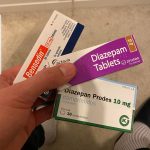How Does Diazepam Make You Feel When You Start Taking It?

Different types of drugs affect your body in different ways, and the effects associated with drugs can vary from person to person. How a drug affects an individual is dependent on a variety of factors including body size, general health, the amount and strength of the drug, and whether any other drugs are in the system at the same time.
In 2015, a man who targeted young girls on the internet used the argument that the anti-obesity drug Duromine made him do it – he said that it reduced his ability to control his impulses. Every now and again, murderers try to blame sedatives or antidepressants for their offenses.
If these claims are true, the implications are profound. The list of potential culprits includes some of the most widely consumed drugs on the planet, meaning that even if the effects are small at an individual level, they could be shaping the personalities of millions of people.
What is Diazepam?
Diazepam, first marketed as Valium, is a medicine of the benzodiazepine family that acts as an anxiolytic. It is commonly used to relieve anxiety and to control agitation caused by alcohol withdrawal. It is also used along with other medications to control muscle spasms and spasticity caused by certain neurological disorders such as cerebral palsy (a condition that causes difficulty with movement and balance), paraplegia (inability to move parts of the body), athetosis (abnormal muscle contractions), and stiff-man syndrome (a rare disorder with muscle rigidity and stiffness).
Diazepam is classified as a Schedule IV controlled substance because of its abuse potential and risk for physical and psychological dependence. Prescriptions may be refilled only a limited number of times; ask your pharmacist any questions you have about refilling your prescription. Popular brands of diazepam include Valium, Bensedin and Diastat.
How it works
Diazepam belongs to a class of drugs called benzodiazepines. A class of drugs refers to medications that work similarly. They have a similar chemical structure and are often used to treat similar conditions.
Diazepam increases the activity of gamma-aminobutyric acid (GABA), a special chemical that can send signals throughout your nervous system. If you don’t have enough GABA, your body may be in an excited state and cause you to have anxiety, get muscle spasms, or have seizures. When you take this drug, you’ll have more GABA in your body. This will help decrease your anxiety, muscle spasms, and seizures.
How should diazepam be used?
Diazepam comes as a tablet, a solution, and as a concentrate (liquid) to take by mouth. It is usually taken 1 to 4 times a day and may be taken with or without food. Follow the directions on your prescription label carefully, and ask your doctor or pharmacist to explain any part you do not understand. Take diazepam exactly as directed.
Diazepam is available for oral administration as tablets containing 2 mg, 5 mg, or 10 mg.
- For oral dosage forms (solution or tablets):
- For anxiety:
- Adults—2 to 10 milligrams (mg) 2 to 4 times a day.
- Older adults—At first, 2 to 2.5 mg 1 or 2 times a day. Your doctor may increase your dose if needed.
- Children 6 months of age and older—At first, 1 to 2.5 mg 3 or 4 times per day. Your child’s doctor may increase the dose if needed.
- Children up to 6 months of age—Use is not recommended.
- For alcohol withdrawal:
- Adults—10 milligrams (mg) 3 or 4 times for the first 24 hours, then 5 mg 3 to 4 times per day as needed.
- Older adults—At first, 2 to 2.5 mg 1 or 2 times a day. Your doctor will gradually increase your dose as needed.
- Children—Use and dose must be determined by your doctor.
- For muscle spasm:
- Adults—2 to 10 milligrams (mg) 3 or 4 times a day.
- Older adults—At first, 2 to 2.5 mg 1 or 2 times a day. Your doctor may increase your dose if needed.
- Children 6 months of age and older—At first, 1 to 2.5 mg 3 or 4 times per day. Your child’s doctor may increase the dose if needed.
- Children up to 6 months of age—Use is not recommended.
- For seizures:
- Adults—2 to 10 milligrams (mg) 2 to 4 times a day.
- Older adults—At first, 2 to 2.5 mg 1 or 2 times a day. Your doctor may increase your dose if needed.
- Children 6 months of age and older—At first, 1 to 2.5 mg 3 or 4 times per day. Your child’s doctor may increase the dose if needed.
- Children up to 6 months of age—Use is not recommended.
- For anxiety:
Diazepam concentrate comes with a specially marked dropper for measuring the dose. Ask your pharmacist to show you how to use the dropper. Dilute the concentrate in water, juice, or carbonated beverages just before taking it. It also may be mixed with applesauce or pudding just before taking the dose. Stir the mixture gently for a few seconds. Take the entire mixture immediately; do not store it for future use.
If you are taking diazepam along with other medications to control seizures, do not stop taking diazepam without talking to your doctor, even if you experience side effects such as unusual changes in behavior or mood. If you suddenly stop taking diazepam, your seizures may get worse. Your doctor will probably decrease your dose gradually.
How Does Diazepam Make You Feel?
Diazepam works by calming the brain and nerves which can make you feel sleepy, dizzy, relaxed, calm, and forgetful when you first start taking it. Some people report that diazepam makes them feel emotionally numb, but this might be a sign your dose is too high or that it’s not the right medication for you.
Diazepam can make it difficult to concentrate during the first few days of treatment and you may experience blurred vision and muscle weakness.
Diazepam is most often used by people who need help dealing with the stress of daily life. These people are also the ones most likely to abuse it. While there are several reasons for Diazepam abuse, many of those abusing the drug don’t take it to get high. They take it to feel normal — to relieve stress and anxiety. People also abuse Diazepam because it helps them sleep. Diazepam produces a sense of intense calm and euphoria, especially in higher doses.
Apart from being habit-forming, diazepam may also cause physical dependence (a condition in which unpleasant physical symptoms occur if a medication is suddenly stopped or taken in smaller doses), especially if you take it for several days to several weeks. Do not stop taking this medication or take fewer doses without talking to your doctor. Stopping diazepam suddenly can worsen your condition and cause withdrawal symptoms that may last for several weeks to more than 12 months. Your doctor probably will decrease your diazepam dose gradually. Call your doctor or get emergency medical treatment if you experience any of the following symptoms:
- Unusual movements
- Ringing in your ears
- Anxiety
- Memory problems
- Difficulty concentrating
- Sleep problems
- Seizures
- Shaking
- Muscle twitching
- Changes in mental health
- Depression
- Burning or prickling feeling in your hands, arms, legs, or feet
- Seeing or hearing things that others do not see or hear
- Thoughts of harming or killing yourself or others; overexcitement; or losing touch with reality.
The symptoms are more intense for those who took larger, more frequent doses. The process of diazepam detox might last anywhere from a few weeks to several months. Abruptly quitting can be very dangerous.





